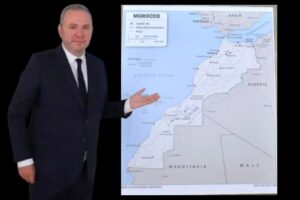
Moroccan Sahara
Rabat — Morocco has renewed its claim to the Eastern Sahara, a territory at the heart of one of North Africa’s longest-running disputes, by invoking both historical evidence and colonial-era grievances. The latest developments came after France’s ambassador to Rabat appeared in a widely circulated video showing a map that placed the Eastern Sahara within Morocco’s borders. For many observers, the gesture was more than symbolic—it hinted at a subtle shift in European diplomatic postures.
For Rabat, the Eastern Sahara is not a new issue but an extension of its decades-long territorial agenda. Moroccan officials argue the land was historically administered as part of the kingdom’s southern provinces before French colonial authorities reassigned it to Algeria during the protectorate period. The reassignment, they contend, was arbitrary and unjust, leaving behind a “colonial scar” that still shapes relations today.
Adding weight to the claim, Moroccan analysts frequently cite a once-classified CIA memorandum, which described Morocco’s sovereignty extending from Hassi Beida to M’Hamid Ghizlane. The document, declassified years after independence, has become part of Rabat’s diplomatic narrative that places responsibility squarely on France for engineering the border issue.
The timing of the French ambassador’s video raised eyebrows. Few believe such a move would be made without clearance from Paris. Some regional experts see it as a carefully calculated signal of goodwill toward Rabat at a moment when European capitals are reassessing their strategic ties in North Africa, particularly amid growing energy demands and security concerns in the Sahel.
Algeria, which administers the land in question, has reacted with irritation. Officials in Algiers view Morocco’s renewed claims as an attempt to destabilize regional balances, already strained by the rivalry between the two neighbors. The tension underscores how colonial-era decisions continue to cast long shadows, with lines drawn on maps nearly a century ago now resurfacing in 21st-century diplomacy.
For Morocco, however, the matter is framed less as provocation and more as restoration. The maxim “what belongs to Caesar shall return to Caesar” has been invoked by supporters to underline the belief that history, not colonial decree, should determine modern borders.
The renewed focus on Eastern Sahara highlights a broader reality: unresolved legacies of colonial rule still shape today’s geopolitical disputes. Whether this latest moment is a symbolic gesture or the beginning of a more assertive campaign, it serves as a reminder that for many nations, history is not past—it remains a central part of their political present.
